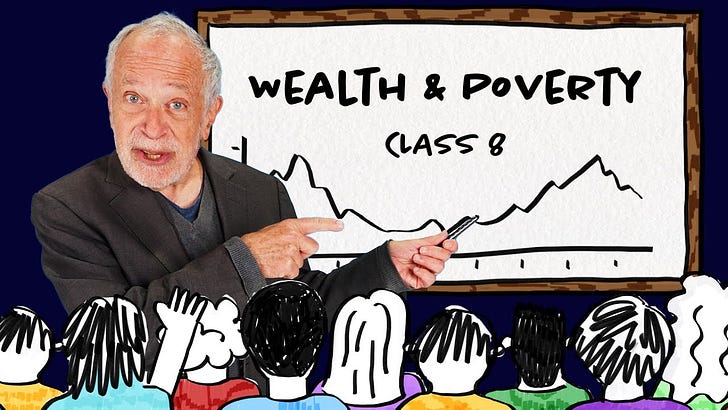Friends,
This week we look at one of the most hidden of all contributors to widening inequality — macroeconomic policies. Given the current fight over the debt ceiling and the budget deficit, the timing of this class couldn’t be better. Just click on the link below and you’re in.
The questions I’ll focus on are: What’s the effect of macroeconomic policy on inequality? What’s the difference between fiscal and monetary policies? How fast can the economy grow without igniting inflation? How should inflation be remedied? How and under what conditions does faster growth reduce inequality?
Don’t worry if you haven’t had a course in macro. We’ll be approaching the subject from an entirely different direction from standard courses, which rarely if ever explore distributional consequences.
This week’s readings (again, just click on the link):
Monetary Policy:
Karen Petrou, “Only the Rich Could Love This Economic Recovery,” The New York Times, July 12, 2021
Rohan Gray, “RIP, Paul Volcker: The Fed Chair Who Thought We Lived Too Well,” The Nation, December 11, 2019
Fiscal Policy:
Bittle, Jake, “The Next Austerity Battle Will Be Fought in the States,” The American Prospect, April 8, 2020
John Cassidy, “The Demand Doctor,” The New Yorker, October 3, 2011
Have fun!
***
If you’ve missed any classes, no worries. Here are the links for all that I’ve already posted: Class 1, Class 2, Class 3, Class 4, Class 5, Class 6, and Class 7. There will be 14 in all.
Please share!



In 1861 members of the Republican Party, who, back then, were True American Patriots, invented the U.S. income tax and graduated it to make sure that “the burdens will be more equalized on all classes of the community, more especially on those who are able to bear them,” as Senator William Pitt Fessenden (R-ME) put it and Justin Smith Morrill (R-VT) agreed saying “Not upon each man an equal amount, but a tax proportionate to his ability to pay.”
How about it Republicans? It was your party that helped our country get back on its feet after the Civil War.
A 2020 study by Carter C. Price and Kathryn A. Edwards of the RAND Corporation showed that the changing economic distribution systems of the past forty years, starting with Ronald Reagan, have moved a staggering $50 trillion upward, out of the hands of the bottom 90% of Americans. (The national debt is currently about $31.5 trillion.)
To me that means the top 10% could pay off the country’s deficit and still have Trillions left over!!!
A very special thank you to HCR for the very important history lesson.
The term "Macro" refers to something that can be easily seen with the naked eye conversely "micro" refers to something that needs the assistance of a mechanical device to make something large enough to be viewed. Our economic problems are of such a dimension that they can be seen from the moon. Politically driven, our finical problems have been put in place to cause complications not to solve them. The Republicans are using economic power to weaken the current administration with little to no concern for the country as a whole. Their lust for power and control is the result of one man's greed and short sightedness. Donald Trump needs no microscope to be understood, he exists for one purpose and one purpose only, himself. Following him has no economic position of any value, it will only leave a person floundering in stupidity. His pressering of McCarthy to throw sand in the gears of our government is typical of a man that doesn't understand this country or our people.